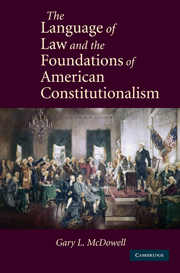Book contents
- Frontmatter
- Contents
- Preface and Acknowledgments
- The Language of Law and the Foundations of American Constitutionalism
- Introduction: The Politics of Original Intention
- 1 The Constitution and the Scholarly Tradition: Recovering the Founders' Constitution
- 2 Nature and the Language of Law: Thomas Hobbes and the Foundations of Modern Constitutionalism
- 3 Language, Law, and Liberty: John Locke and the Structures of Modern Constitutionalism
- 4 The Limits of Natural Law: Modern Constitutionalism and the Science of Interpretation
- 5 The Greatest Improvement on Political Institutions: Natural Rights, the Intentions of the People, and Written Constitutions
- 6 Chains of the Constitution: Thomas Jefferson, James Madison, and the “Political Metaphysics” of Strict Construction
- 7 The Most Sacred Rule of Interpretation: John Marshall, Originalism, and the Limits of Judicial Power
- 8 The Same Yesterday, Today, and Forever: Joseph Story and the Permanence of Constitutional Meaning
- Epilogue: The Moral Foundations of Originalism
- Index of Cases
- General Index
Preface and Acknowledgments
Published online by Cambridge University Press: 05 June 2012
- Frontmatter
- Contents
- Preface and Acknowledgments
- The Language of Law and the Foundations of American Constitutionalism
- Introduction: The Politics of Original Intention
- 1 The Constitution and the Scholarly Tradition: Recovering the Founders' Constitution
- 2 Nature and the Language of Law: Thomas Hobbes and the Foundations of Modern Constitutionalism
- 3 Language, Law, and Liberty: John Locke and the Structures of Modern Constitutionalism
- 4 The Limits of Natural Law: Modern Constitutionalism and the Science of Interpretation
- 5 The Greatest Improvement on Political Institutions: Natural Rights, the Intentions of the People, and Written Constitutions
- 6 Chains of the Constitution: Thomas Jefferson, James Madison, and the “Political Metaphysics” of Strict Construction
- 7 The Most Sacred Rule of Interpretation: John Marshall, Originalism, and the Limits of Judicial Power
- 8 The Same Yesterday, Today, and Forever: Joseph Story and the Permanence of Constitutional Meaning
- Epilogue: The Moral Foundations of Originalism
- Index of Cases
- General Index
Summary
The debate over the proper role of judges in the Anglo-American legal system is as old as the system itself. Long ago, Thomas More summed it up in a way that could have been clipped from yesterday's news, making clear there was no doubt in his mind about what Sir John Baker has called simply the “evil of judicial arbitrariness.” More was unambiguous: “If you take away laws and leave everything free to the judges,” he argued, “…they will rule as their own nature leads and order whatever pleases them, in which case the people will in no wise be more free but worse off and in a condition of slavery, since instead of settled and certain laws they will have to submit to uncertain whims changing from day to day.” This is not a matter of regrettable personal excess, but of inevitable institutional inclination; without restraint, More concluded, “this is bound to happen even under the best judges.”
Two and a half centuries later, Sir William Blackstone would make largely the same argument in his Commentaries on the Laws of England, arguing that “the liberty of considering all cases in an equitable light must not be indulged too far, lest thereby we destroy all law, and leave the decision of every question entirely in the breast of the judge.”
- Type
- Chapter
- Information
- Publisher: Cambridge University PressPrint publication year: 2010



